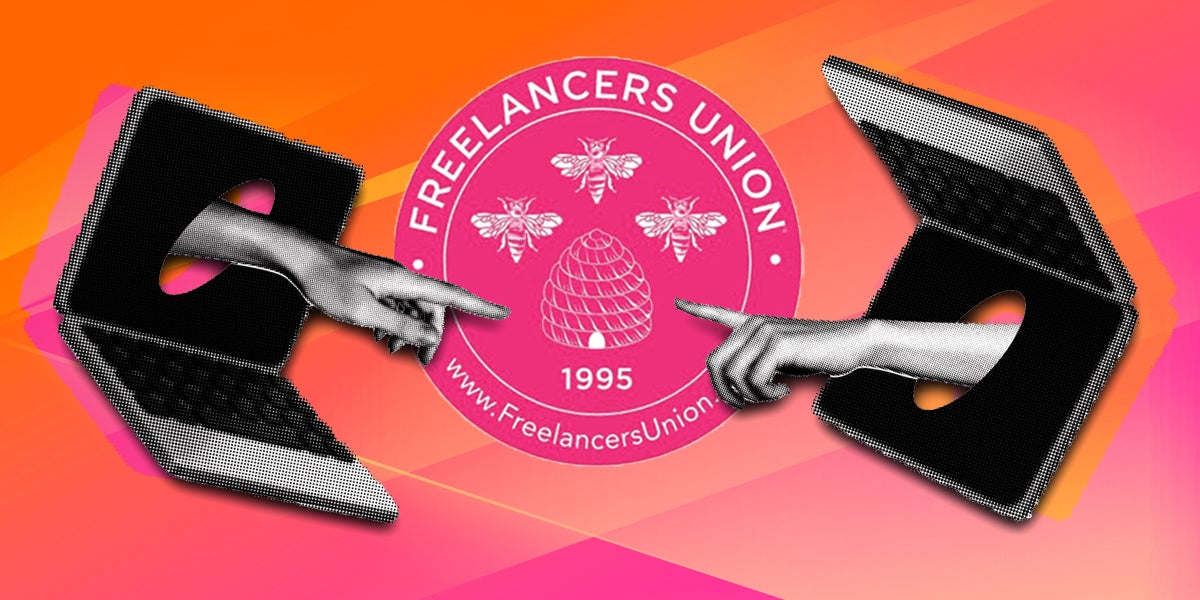
The number of freelancers in the United States is continuing to grow. In 2023, an estimated 64 million Americans—or 38% of the workforce—engaged in some sort of freelance work.
However, freelancers often lack the same protections and resources that traditional employed workers have in the United States. Certain organizations, including the Freelancers Union, are hoping to band together to change that.
What Is the Freelancers Union?
Freelancers Union is a New York-based non-profit founded in 1995 to help independent contractors and other workers who aren’t traditionally employed navigate the freelance landscape by offering free resources and building community.
The group also emphasizes advocating for stronger protections for freelance workers and has helped champion relevant laws across the country.
Two examples are the Freelance Isn’t Free Act in New York City (2017) and Los Angeles (2023). These laws focus on ensuring freelancers get paid for their work in a timely manner—and that companies risk hefty penalties for failing to comply or retaliating against freelancers for reporting violations.
As of 2024, the Freelancers Union asserts that it has over 500,000 members across the United States.
Is the Freelancers Union Legit?
Is the Freelancers Union a legitimate organization? Yes.
Is it a legitimate trade union? No.
The National Labor Relations Act of 1935 protects employees’ rights to unionize, enabling them to utilize collective bargaining and call for strikes while preventing employer retaliation. However, the act also generally prevents independent contractors (among several other types of workers) from unionizing in the same way.
Who Can Join the Freelancers Union?
Because the Freelancers Union isn’t technically a union, the idea of membership is much more lax. Anyone in the United States who works as a freelancer in one of the fields listed on their website—areas of work that are commonly performed by independent contractors—is welcome to sign up.
Is It Free To Join the Freelancers Union?
Yes! Joining the Freelancers Union is absolutely free. There’s no initiation fee, and there are no membership dues, as there is, technically, no official membership in the way that there is for trade unions.
Many of the organization’s resources are also free. The website features several blogs and guides specifically geared toward freelancers on topics like taxes, health insurance, contracts, and more.
What Benefits Does the Freelancers Union Offer?
In addition to online resources advising freelancers on complicated and often unfamiliar topics, joining the Freelancers Union offers several other notable benefits.
Meetings
SPARK meetings give freelancers in certain cities the opportunity to come together and discuss work-related and ongoing issues. They’re a member-led initiative that takes place once a month and is intended to build a stronger community of freelancers.
Freelancers Hub
New York City residents have limited access to Freelancers Hub, a co-working space in Brooklyn. Anyone can work in the space ten days out of the month. Those who purchase an unlimited membership for $30 per month can work in the space as frequently as they like. They are also granted access to perks and discounts pertaining to the Hub, as listed on the website.
Additionally, the union organizes several events, workshops, and other programs at the Hub, many (but not all) of which are free. You can RSVP for these special programs and the co-working space online or check out the in-house photography studio, which can be booked at an additional rate.

Insurance
Insurance can be a major challenge for freelancers in the United States. Health insurance, in particular, is generally tied to traditional employment, leaving freelancers struggling to find affordable plans that work.
The Freelancers Union has partnered with various companies to offer solutions regarding health insurance, telehealth options, life insurance, and more. However, we’ve found that these plans are often more expensive than using the federal insurance markets.
Getting Involved
Advocacy is a major part of the union. They fight for better working conditions for all freelancers across the United States and encourage members to get involved. This may be a great opportunity if you want your voice to be heard on some pressing issues facing freelancers today. You can check out the current causes they are championing here.
Discounts & Perks
Like many organizations, the Freelancers Union has partnered with various companies to obtain discounts on goods and services they feel may benefit their membership. These aren’t necessarily going to be deals you can’t find elsewhere with some careful searching or fortuitous timing, but they may still be useful.
What Can’t the Freelancers Union Do?
Unfortunately, as a nonprofit, the Freelancers Union lacks the ability to do many things traditionally associated with trade unions. For instance, it is unable to engage in collective bargaining with companies on behalf of members. It is also unable to negotiate contracts or represent freelancers in disciplinary or grievance meetings.
How Do I Join the Freelancers Union?
Signing up is simple: go to the website, click Join For Free, and fill out the form.
You’ll be asked for basic info, such as your name, zip code, date of birth, and contact information. You’ll also be asked how long you’ve been freelancing.
Freelancers can also link to a portfolio or professional website you’d like to share. It’s okay if you don’t have one. Finally select one or more of the following fields best describes the type of freelance work you do:
- Advertising / Marketing
- Communications
- Construction / Building & Design
- Education / Training
- Fashion / Designer
- Film / Television
- Financial Services
- Graphic Design / Web Design
- Hair / Makeup
- Health and Wellness
- Hospitality / Travel
- Information Technology / Web Development
- Journalism / Writing
- Legal Services
- Live Performance
- Manufacturing / Maker
- Music
- Nonprofit
- Publishing
- Retail
- Transportation / Driving
- Visual Arts / Photography
Despite the Freelancers Union’s inability to offer the same benefits enjoyed by members of trade unions in the U.S., there’s no real drawback to taking advantage of the resources it can provide.
With advocacy for better working environments for freelancers continuing to be a major tenet of the organization, who knows what might be on the table in the future? Currently, the Freelancers Union is a good start. We hope to see them expand in the future to offer more advocacy options.




